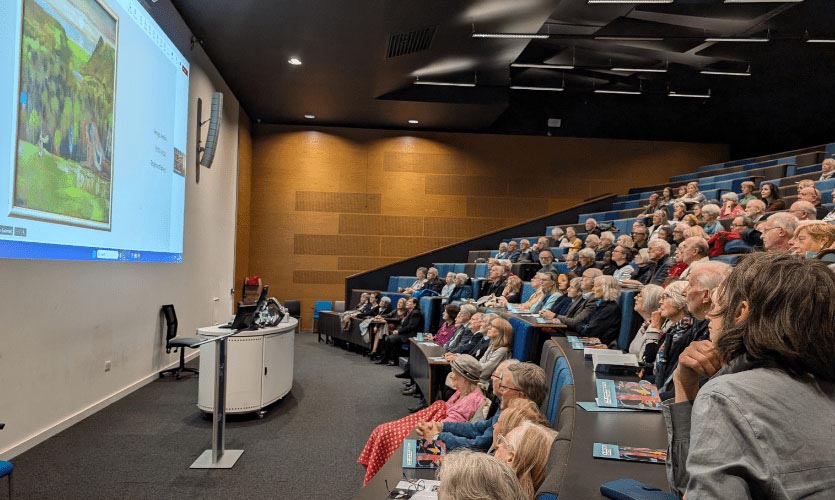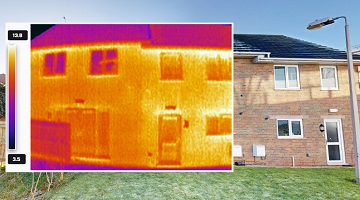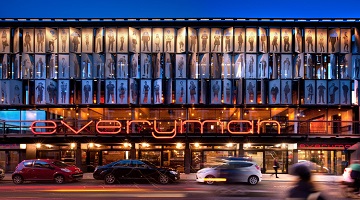Why study Architecture at Liverpool John Moores University?
- LJMU ranked 13th university in the UK for Architecture (The Times UK University Rankings 2025)
- 96% of students surveyed said this course challenged them to achieve their best work (National Student Survey 2024)
- 94% of students surveyed said the teaching on the course was good or very good (National Student Survey 2024)
- Students can access study abroad opportunities and apply for overseas travel awards
- Access to some of the UK's best examples of urban redevelopment and iconic buildings
- Teaching in the RIBA award-winning, purpose-built John Lennon Art and Design Building
- European and UK study trips included within the programme
- Exemptions from RIBA Part 1 exams on graduation
- Direct involvement in live artistic projects taking place in the city
- To see what our students are doing and understand our studio culture please visit the Architecture Instagram
About your course
This professionally validated programme gives you the opportunity to work on a range of authentic architectural projects in a dynamic studio environment within the Liverpool School of Art & Design. Input from practicing architects and access to industry standard technical facilities gives you a rigorous and stimulating programme of study.
Taught principally through a studio environment that is seamlessly underpinned and informed by lectures and workshops, the over-arching ambition of the programme is to create graduates with artistic flair, and who are technically skilled and grounded in the demands of the professional role of the architect.
The learning and teaching environment is progressively informed by research in pedagogy in the creative field. While teaching the curriculum, the programme also develops less tangible skills in students, such as communication, presentation and self-motivation; a key ambition is to create independent thinkers, adept at resolving problems with creativity and originality.
A broad educational experience is offered within which students can develop diverse rigorous and creative approaches to design issues that explore and test appropriate resolutions in relation to contemporary and anticipated contextual issues.
Design projects form the backbone of the core teaching strategy. These projects are seen as primers to a divergent creative and critical thought process: they are characterised by individual interpretation and interest of the subjects that encourage imaginative solutions through discursive studio forums.
As you progress through the degree, the design projects gradually become larger in scale, more complex and ambitious in their intentions and integrative in their nature. At degree level, predominantly, the city of Liverpool is used as a contextual laboratory to test concepts that have a local flavour with global implications.
The aim is to develop graduate skills and knowledge such that they become autonomous thinkers who are capable of analysing, visualising and testing potential solutions to increasingly complex spatial and social issues within an increasingly holistic global scenario.
Professional accreditation/links
This course is fully accredited by the RIBA (Royal Institute of Architects).
Liverpool School of Art and Design, where Architecture is taught, has many links with artistic and cultural institutions both nationally and locally, including RIBA and FACT (the Foundation of Arts and Creative Technologies), and collaborates regularly on both live projects and exhibitions.
In the recent 2022 RIBA Board Report, issued after their visit to the University, they commended the School of Art and Design for the provision of excellent facilities and technicians, which is "greatly appreciated by students". The board also commented that Architecture staff show a notable commitment to the students in respect of pastoral care and teaching, "in particular during the period of pandemic."
Dion Barrett, BA Architecture and MArch Graduate
Studying at the LJMU School of Art and Design allowed me to be exposed to other disciplines such as Fashion, Art, Graphic Design and Illustration, that really shaped the way I thought about Architecture within the wider context of design. The common denominator was how success often came down do how well we communicate our ideas, and having your influences come from a broad spectrum really strengthens that ability. This honed skill is essentially me helping other architects to communicate their ideas and value.
Read more about Dion's experience at LJMU
Fees and funding
Tuition Fees:
- Home fee:
- £9,535
There are many ways to fund study for home and international students
Fees
The fees quoted above cover registration, tuition, supervision, assessment and examinations as well as:
- library membership with access to printed, multimedia and digital resources
- access to programme-appropriate software
- library and student IT support
- free on-campus wifi via eduroam
Additional costs
Although not all of the following are compulsory/relevant, you should keep in mind the costs of:
- accommodation and living expenditure
- books (should you wish to have your own copies)
- printing, photocopying and stationery
- PC/laptop (should you prefer to purchase your own for independent study and online learning activities)
- mobile phone/tablet (to access online services)
- field trips (travel and activity costs)
- placements (travel expenses and living costs)
- student visas (international students only)
- study abroad opportunities (travel costs, accommodation, visas and immunisations)
- academic conferences (travel costs)
- professional-body membership
- graduation (gown hire etc)
Funding
There are many ways to fund study for home and international students. From loans to International Scholarships and subject-specific funding, you'll find all of the information you need on our specialist funding pages.
- International fee:
- £18,250
International Scholarships and payment plans
Liverpool John Moores University is committed to supporting international students by providing a range of scholarships and flexible payment plans to help students manage their tuition fees.
Scholarships
LJMU provides a variety of scholarships to support international students. Scholarships are available to self-funded students who have accepted their offer and met all the conditions outlined in their offer letter. Students must also demonstrate that they can cover living costs, travel, and other expenses associated to studying at the university. Postgraduate scholarships include tuition fee reductions and are often offered in partnership with external funding organisations.
All self-funded international students are eligible for an automatic scholarship worth up to £4,000. For more details and to view our full list of scholarships, visit the international scholarship webpages.
Deposit
All students must pay a £5,000 deposit before they can receive their CAS letter.
For more information view our deposit page.
Tuition Fee Payment Plan
After paying their £5,000 deposit, students have the option to pay their fees in full or in three equal instalments minus any internal scholarships and discounts. There are two payment options available for international students. You can either pay your tuition fees in full before enrolment or opt for a payment plan. With the payment plan, you can pay your fees in three instalments after making your £5,000 deposit. The first instalment is due before enrolment.
All payments should be made through Flywire. Full details can be found in the How to Pay Guide.
Early Bird Tuition Fee discount
We are excited to introduce a £500 Early Payment Discount to all self-funded international students. Eligible self-funded students who pay their fees by the required deadlines will get a discount which will be automatically deducted from the 1st year of tuition fees.
To see the required deadlines please visit the webpage
Course modules
What you will study on this degree
Further guidance on modules
Modules are designated core or optional in accordance with professional body requirements, as applicable, and LJMU’s Academic Framework Regulations. Whilst you are required to study core modules, optional modules provide you with an element of choice. Their availability may vary and will be subject to meeting minimum student numbers.
Where changes to modules are necessary these will be communicated as appropriate.
Core modules
History and Theory 1: a global review of architectural Design
20 credits
20 credits
Within this module you will become familiar with historically significant buildings and to understand the relationship of these buildings to their contexts. You will learn to recognise themes in specific objects, which have influenced architectural and interior design thought and discourse. In doing so, you will become aware of how architectural ideas have emanated from certain cultural conditions, and their relevance to society then and now. This will enable you to develop a coherent argument with reference to the lecture series and individual research. You will be able to demonstrate the personal development discussed above by the production of an illustrated and fully referenced essay.
Fundamental Skills: Understanding buildings through drawing
20 credits
20 credits
This module will introduce you to methods of architectural and spatial analysis, alongside the interpretation of ideas which underpin the creation of architectural space and composition. You will develop the fundamental skills of architectural drawing in a range of media, utilising architectural conventions. This will help you to engage in the fundamentals of analysis of architectural design through an understanding of space, light and order.
Within the module, you will also be introduced to the nature of construction and will develop an understanding of the different construction materials. This module was developed to introduce and formalise a programme of self-learning and key skills for interior architecture students.
Design 1: Light, space and form; narrative and spatial sequencing
20 credits
20 credits
This module will introduce you to methods of research, exploration and the interpretation of ideas which underpin the creation of space and composition. You will engage in the fundamentals of spatial design through an understanding of space, light and architectural directive through the exploration of physical models.
This module was developed to introduce and formalise a programme of self-learning and key skills for interior architecture students.
Design 2: Exploration for a place for making
20 credits
20 credits
Within this module you will research and devise a historical and theoretical essay as a means to formulate a design brief and directive. You will be provided the opportunity to design a building incorporating students' urban design ideas and, in particular, the interface condition between building and the street and context. This will enable you to explore and interpret thematic ideas as a poetic process in design.
Design 3: Crafting a Spatial Proposition
10 credits
10 credits
This module will provide you with an opportunity to refine and conclude the design of a building incorporating urban design ideas and, in particular, the interface condition between building and the street and context. You will explore and synthesise thematic ideas as a process in design. You will have a chance to further develop the phenomenon of 'place' as an interrelated programme of activities embracing techniques of strategy-making, space-planning, building and structural organisation underpinned by spatial investigations through the consideration of light. This will introduce you to the nature of architectural assembly within current sustainable thinking.
Design 4: the Need for Design
10 credits
10 credits
This module will help you to understand how the needs, wants, desires and behaviours of users and commissioners, shape briefs, opportunities, spaces and projects. In doing so, you will be introduced to the methods of investigation and preparation of a design brief. This will aid you when exploring the role of the designer/architect in translating the needs of a user group into a deliverable spatial outcome.
Environment and Technology 1: Introduction to structural and environmental design
20 credits
20 credits
This module will introduce you to the role of technology in the process of architectural design from commencement to realisation, as it has existed historically as well as in recent buildings of note. Accent is placed on innovatory thinking and on the present technical and practical horizons possible within the profession of architecture viewed internationally. The module will provide you with grounding in the challenges of building high quality architecture.
Core modules
History and Theory 2: Modernism; from the symbol of the present to the medium of the future
20 credits
20 credits
The aim of the module is to explore Modernism, postmodernism and the emerging metamodernism, its precedents and worldwide antecedents and to help students to develop their analytic voice through a series of lectures, seminars and assignments in preparation for the more detailed and focused tasks of the subsequent final year of study. In addition, you will be encouraged to develop your research, writing and editing skills to have a wider scope of context and a deeper appreciation of how critical theory can help in dissecting the work of practitioners and their creative processes.
Design 5: City Design; analysing and shaping the city
20 credits
20 credits
This module introduces the principles of urban design and how these relate to the design and development of cities, past and present. It explores the role of urban strategy in shaping the contemporary built environment
Design 6: Building in the city; enriching urban form through architecture
20 credits
20 credits
This module develops the urban design strategy into a building design proposal for a key site within the strategy. Module outputs will demonstrate the design proposal both spatially and technically within the urban context.
Integrated Design 1: Explorative Project - Design
20 credits
20 credits
This module will help you to explore the processes in architectural design thinking, production and representation. You will develop your abilities in creative detailed design, design development and resolution, underpinned by thematic architectural inquiry.
This module is informed by thematic research, as appropriate to each project. From a given starting point you will be encouraged to explore and define the parameters of the field of inquiry for your project. In so doing, the aim is that you will devise your own objectives for research, brief, developmental interpretation and ultimately detailed design response.
Integrated Design 2: Explorative Project - Technology
20 credits
20 credits
This module will develop your knowledge of explorative processes in architectural design thinking, production, technical studies, and representation. You will further develop your abilities in creative detailed design and detailed resolution of their design project. Alongside this, you will also explore the integrated consideration of technical issues in relation to your design project. This module comprises one assignment; to demonstrate the tectonic resolution of this design project.
Environment and Technology 2: Use and application of Building Information Modelling
20 credits
20 credits
This module was developed to inform you about the topics of environmental design and Computer Aided Design. This module builds on the broad introduction given at Level 4, by focussing on the technical realisation of buildings through modelling, analysis, and design.
Optional Modules
Study Semester Abroad - Architecture
60 credits
60 credits
The aim is to provide students with a semester of study at an approved overseas partner that will replace one semester of their LJMU programme at level 5.This is a semester of full-time study at an approved higher education institution which will replace one semester of level 5 study at LJMU. The modules to be studied must be agreed in advance, and must be an appropriate substitute for the modules being replaced. Assuming successful completion of this semester, mark-bearing credit will be awarded by the Faculty Recognition Group. The grade conversion scale to be used will be made available in advance of the semester abroad.
Core modules
Design Project Research - CDP
20 credits
20 credits
To module will provide you with an understanding of research as a process for enabling the development of a thematic brief, to then be developed spatially as part of module 6121ARC or 6121INT. Alongside this, you will also develop your knowledge of architecture / interior architecture, its theories and contextuality with focus upon contemporary practice. This will help you to engage in analysis of architectural designs of this period and relate them to contemporary philosophical ideas and social phenomena. You will undertake contextual analysis and wider research to inform the initial stages of a Comprehensive Design Project module 6123ARC or 6123INT.
Integrated Design 2: Weather or not - explorations around climate
20 credits
20 credits
The theme of this module is environment, ecology and sustainability. These topics are explored through the programmatic interpretation and the spatial resolution of a building in response to these themes. This module will introduce students to the importance of understanding and interpreting cultural ideas/phenomena related to sustainability. The intention is to engage students in the process of interpreting spatially design brief and investigating through three-dimensional studies the notion of changing culture as built form. Presentation of designs will take the form of models, diagrams, drawings and other creative media, and will be presented in exhibition and portfolio format.
Integrated Design 2: Supporting Studies
20 credits
20 credits
Integrated Design 3: Comprehensive Design Project
40 credits
40 credits
This module guides students in creating a comprehensive design for a medium-sized building, drawing from various course modules. It assesses their abilities in areas such as site planning, landscaping, conceptual design, and technical strategies. This module represents the culmination of the degree program and requires a high level of individual interpretation, design skill, and technical resolution.
Practice and Legislation: Ethical design practice and building legislation
20 credits
20 credits
This module aims to introduce you to the essential knowledge and discussion concerning the practice of Architecture. Emphasis will be placed on demonstrating in-depth skills in both thematic-led design and proven technical competence that are graduate standard and which graduates will confront within offices in their work placement year.
Your Learning Experience
Excellent facilities and learning resources
We adopt an active blended learning approach, meaning you will experience a combination of face-to-face and online learning during your time at LJMU. This enables you to experience a rich and diverse learning experience and engage fully with your studies. Our approach ensures that you can easily access support from your personal tutor, either by meeting them on-campus or via a video call to suit your needs.
During Level 4, you will be introduced to fundamental tools and ideas that form the basis for the study of architecture. In parallel, the interpretation of themes and conceptual thinking will be established within the years overall focus of Form, Space and Light.
During Level 5, you will explore two core aspects of architectural thinking: Contextualism and Experimentation and complete a study trip to a city in Europe. You will also complete modules which will inform and aid your work in the design studio.
The final year, Level 6, focuses on environment, sustainability and ecology where architecture is seen as emerging from and responding to a holistic context of contemporary cultural and environmental programmatic issues. You will secure the skills and knowledge required to practice architecture via a creative but rigorous approach to design project work.
Dedicated personal tutor, plus study skills support
Independent design project work makes up 60% of this course, and so it is vital that you get the support you need to be able to fully develop your design skills. For this reason, you will be allocated a design tutor who will provide one-to-one teaching and support throughout each project.
The feedback system and the production of a personal development plan with a personal tutor are also designed to help you achieve your full potential, in both your studies and your future career plans.
Assessment varies depending on the modules you choose, but will usually include a combination of exams and coursework.
All students perform differently depending on how they are assessed, which is why we use a combination of assessment methods. Typically, you will be assessed on your design and research presentations (group/individual), written work (essays, reports etc), exams (seen/unseen), practical work (workshop abroad), and your portfolio. At the end of your studies there will be a one-to-one interview with an external examiner.
The type of feedback you will receive varies according to the module. For instance, design modules are reviewed twice with formal feedback given by a panel at the second review, and portfolio reviews are conducted at the end of each semester when you will work with your personal tutor to put together a personal development plan. This will address your strengths and weaknesses and help you develop your academic work as well as your career plans.
Where you will study
What you can expect from your School
Cross-disciplinary learning in art and design subjects takes place in the Liverpool School of Art and Design 's John Lennon Art and Design Building, based in the Mount Pleasant Campus. Here students studying a variety of disciplines, including Architecture, Art in Science, Exhibition Studies, Fashion, Fine Art, Graphic Design, History of Art and Museum Studies and Interior Architecture, will have the opportunity to develop their work in state-of-the-art workspaces and facilities within a stimulating and critically demanding environment.
I wanted to receive an education that gave me the skills required to work in the real world. Studying at LJMU proved to be the best option, since they offered a well rounded education that focused on both design and technology.
Course tutors
Our staff are committed to the highest standards of teaching and learning
-
 Lecturer/Senior Lecturer
Lecturer/Senior Lecturer -
 Lecturer/Senior Lecturer
Lecturer/Senior Lecturer -
 Lecturer/Senior Lecturer
Lecturer/Senior Lecturer -
 Lecturer/Senior Lecturer
Lecturer/Senior Lecturer
Career paths
To become a registered architect you usually need to work for an additional year in architectural practice then complete a two-year Master of Architecture (MArch) diploma. Once you have passed the RIBA Part 3 exams, you can practice in any EU or commonwealth country and many other countries outside the EU.
If after graduating you choose not to go down the route of becoming a registered architect, a range of other careers are open to you. Past graduates have pursued successful careers as project managers, property developers, building contractors, furniture designers, lighting designers, architectural visualisation artists and journalists.
Many of our graduates have successfully secured employment at world-class practices throughout the UK and further afield, while others have remained in the city of Liverpool contributing to its evolution, taking key roles in leading practices that have reshaped the city over the last decade.
Student Futures - Careers, Employability and Enterprise Service
A wide range of opportunities and support is available to you, within and beyond your course, to ensure our students experience a transformation in their career trajectory. Every undergraduate curriculum includes Future Focus during Level 4, an e-learning resource and workshop designed to help you to develop your talents, passion and purpose.
Every student has access to Careers Zone 24/7, LJMU's suite of online Apps, resources and jobs board via the LJMU Student Futures website.
Entry requirements
Please choose your qualifications below to view requirements
Grades/points required from qualifications: ABB-AAB (128-136)
Work out how many UCAS points your qualifications are worth using the UCAS Tariff Calculator.
Qualification requirements
GCSEs and equivalents
A levels
BTECs
Extended Diploma: DDM
Access awards
International Baccalaureate
Acceptable on its own and combined with other qualifications
OCR Cambridge Technical
Extended Diploma: DDM
Irish awards
Acceptable on its own and combined with other qualifications
T levels
Additional requirements
-
Assessment required
Shortlisted applicants will be required to submit a digital portfolio. Applicants will be sent an email requesting they upload a digital portfolio using our upload attachment facility.
Further information
-
DBS, Occupational Health requirements
Is a DBS check required?
No
Portfolio Requirement
Submission of portfolio required
Can this course be deferred?
Yes
International requirements
IELTS
Please Note: All international qualifications are subject to a qualification equivalency check.
How to apply
Securing your place at LJMU
UCAS is the official application route for our full-time undergraduate courses. Further information on the UCAS application process can be found here https://www.ljmu.ac.uk/study/undergraduate-students/how-to-apply.
All short-listed applicants are requested to submit a digital portfolio - portfolio guidance.
Applicants are awarded an offer on the quality of their digital portfolio or work, and academic attainments.
We are looking for students with an enthusiasm for design, who wish to engage in the debate on the future of the built environment.
You should have a willingness to read around the subject widely. You should be willing to gain first hand experience of buildings, towns and cities and acquire information retrieval techniques, as you will be expected to read around the subject and draw upon your findings for essays and projects.
You would be expected to meet the criteria below;
- Critically aware of their surroundings
- Capable of discussing Art & Design issues
- The ability to analyse and reflectively criticise your work and the work of others
- Visual awareness
Your student experience
There's so much more to university than just studying for a degree
Talk to our students
Connect with a current LJMU student through Unibuddy for insights and advice on university life, courses, and more.
See what our students are saying
At LJMU we want you to know you're making the right choice by studying with us. You can see what our students are saying about their experience with us through their reviews on the following websites:
Related Links
Related Links
News and views
Browse through the latest stories and updates from the University and beyond










The university reserves the right to withdraw or make alterations to a course and facilities if necessary; this may be because such changes are deemed to be beneficial to students, are minor in nature and unlikely to impact negatively upon students or become necessary due to circumstances beyond the control of the university. Where this does happen, the university operates a policy of consultation, advice and support to all enrolled students affected by the proposed change to their course or module.
Further information on the terms and conditions of any offer made, our admissions policy and the complaints and appeals process.












